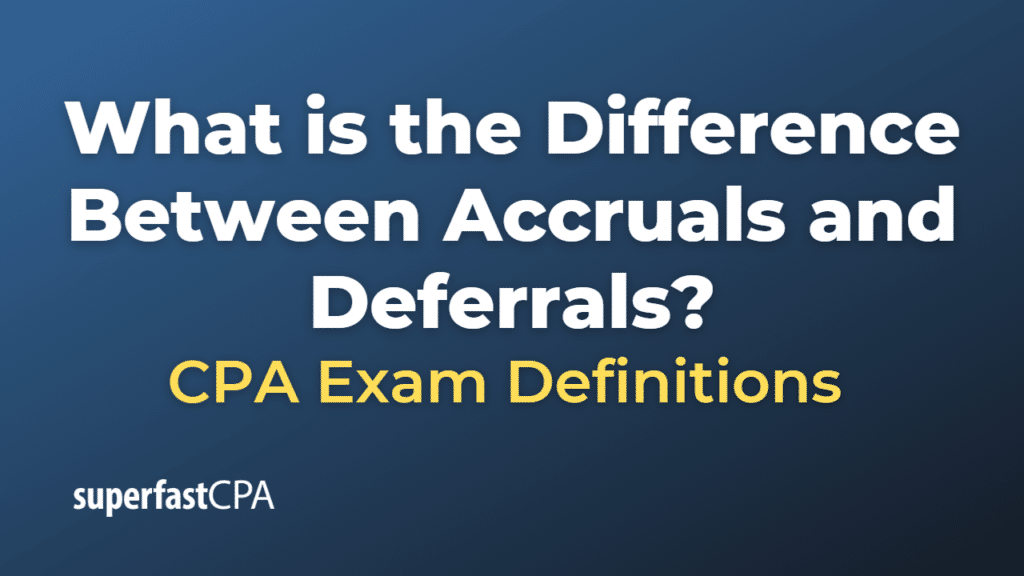Difference Between Accruals and Deferrals
Accruals and deferrals are two key concepts in accrual accounting that deal with the timing of revenue and expense recognition. They both represent transactions that have been recorded but the cash has not yet been received or paid.
Accruals:
Accruals are revenues earned or expenses incurred which impact a company’s net income on the income statement, although cash related to the transaction has not yet changed hands.
For example, if a company provides services to a customer in December but doesn’t get paid until January, the revenue would be recorded in December (when it was earned) rather than in January (when the cash was received). This is called an accrued revenue.
Similarly, if a company incurs expenses in December but doesn’t pay them until January, the expense would be recorded in December (when it was incurred) rather than in January (when the cash was paid). This is called an accrued expense.
Deferrals:
Deferrals, on the other hand, involve transactions in which the cash has been received or paid, but the company has not yet earned the revenue or incurred the expense. These transactions impact the balance sheet.
For example, if a customer pays in December for services to be provided in January, the company would record the payment in December as a liability called deferred revenue or unearned revenue. The revenue would then be recognized in January when the services are actually provided.
Similarly, if a company pays in advance for expenses that it will incur in the future, it records the payment as an asset called prepaid expenses. The expense is then recognized as the benefit is received.
In summary, accruals and deferrals are opposite sides of the same coin: they both involve the delay between the time cash changes hands and the time the transaction is recorded. The key difference lies in whether the cash transaction or the economic event comes first. With accruals, the economic event (earning revenue or incurring an expense) comes before the cash changes hands. With deferrals, the cash changes hands before the economic event occurs.
Example of the Difference Between Accruals and Deferrals
Let’s look at examples for both accruals and deferrals in a business context.
Accrual Example:
Let’s say ABC Consulting provides $5,000 worth of consulting services to a client in December, but the client is not billed until January. Here, ABC Consulting has earned the revenue in December (when the services were provided), even though it won’t receive the payment until January.
So, in December, ABC Consulting would record an accrued revenue of $5,000 in their accounting books, even though cash hasn’t been received yet. This is an example of an accrual because the revenue is recognized when it is earned, not when the cash is received.
Deferral Example:
Now consider a different scenario where XYZ Corp pays $12,000 in December for a one-year lease on office space that begins in January. XYZ Corp has paid the cash, but it hasn’t yet received the benefit of the expense (since the lease starts in January).
In this case, in December, XYZ Corp would record the $12,000 payment as a prepaid expense on their balance sheet, not as an expense on their income statement. This is an example of a deferral because the expense will not be recognized until the company actually starts using the office space in January.
So, in these examples, accruals and deferrals allow the companies to recognize revenues and expenses in the periods they are earned or incurred, not just when cash is received or paid. This aligns with the accrual basis of accounting, which aims to match revenues with the expenses incurred in earning them, providing a more accurate picture of a company’s financial health.













